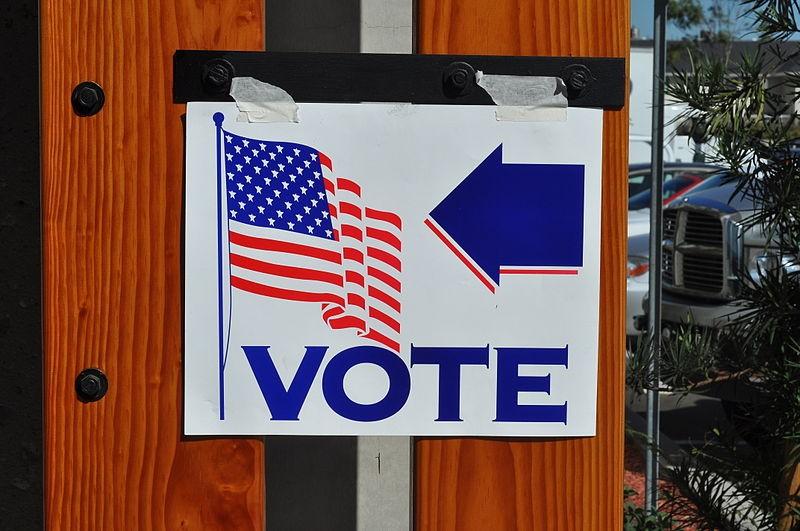A person with a clipboard stops you and asks if you want to register to vote … sound familiar? Voter registration groups have been an active presence on campus since the first week of school, eagerly registering students. Their goal is clear: get students civically engaged and ready to represent the younger generation.
Who are the people with the clipboards?
Student-run groups such as NextGen Rising and the Arizona Public Interest Research Group New Voters Project wanted to educate students on how they can have an impact on the elections as an adult. Both groups seek to get new students involved and civically active.
To do this, they recruited student volunteers to stop students on the street and register them to vote.
Xoe Watchman, an anthropology student and organizer for NextGen, said that within the first week of school they had gotten over 800 people registered to vote on campus alone, not to mention over 11,000 people statewide. By the sixth week NextGen Arizona had registered 16,784 young voters between ages of 18-35 statewide and collected thousands of pledge to vote cards from young voters.
Hannah Picknell, an organizer for the nonpartisan group AZ PIRG New Voters Project, said that their project’s goal was to help remove simple barriers that keep the younger generation from voting, like not knowing how to fill out a voter registration form.
“Our overall message is … it’s our future and we should vote on it, and the more people in our generation [who] are voting and registered to vote, the more people will pay attention to our generation and the issues that we want to prioritize,” Picknell said.
RELATED: McSally, Sinema, Ducey and Garcia win primaries after Aug. 28 voting
NextGen is a partisan organization but their voting registration process is nonpartisan.
According to Symone Gittens, a NextGen AZ Fellow, students registered people to vote through Sept. 8.
Why they want you to register to vote
“We are just trying to register young people to vote and get them civically engaged,” Watchman said. “We want a government that represents everybody and not just some people, so that means that the [voters have] to turn out as much as possible.”
Registration groups don’t seek to register individuals from a specific political party and are legally not allowed to register voters based off their views.
The state director for NextGen America Jalakoi Solomon said, “We know that when more people engage and more people vote, our system is more effective. It will more accurately reflect the will of the people … we register everyone.”
Solomon is motivated to work because she wants marginalized groups to be represented.
“I’m motivated to do this work because I am a black gay woman who knows what it’s like to not have representation, [to have] a voice that tends to be marginalized in society as it is now,” said Solomon. “So, I do this work because I’m fighting for people like me; I’m fighting for my community to make sure that we have access to power, we have access to elected leadership.”
Why do they want college-age adults to vote
“It’s incredibly important,” said Ariane Mohr-Felsen a first-year master’s student in environmental learning and a volunteer for NextGen. “There’s a lot at stake right now and I think that that narrative that our generation is lazy and doesn’t care and is just like kind of obsessed with social media. I just don’t think that’s true.”
Millennials are often criticized for their lack in political engagement, and voter registration groups are trying to change that by hosting events, speaking in classrooms, talking to students on the streets and even training their volunteers on how to talk to students about the importance of their civic duties, according to Mohr-Felsen.
RELATED: The primary is not secondary
“I think it can be a hard time to be young and feel optimistic but the most important thing you can do is make sure your voice is heard about, whatever matters to you. And one way to do that is voting,” said Mohr-Felsen.
The voting registration groups target college students for a reason. Solomon emphasized that in 2018 young people, the 18-to-35-year-old block are the largest voting block in the country. There are more 18-to-35-year-olds who are eligible to vote than there are 65 years and older individuals.
“We are targeting young people because our voices tend not to be heard in the process but also because it’s a smart strategy. It’s smart to focus on the largest voting block because we have power and if we all vote we really will make the difference. So, we are making sure to get young people excited, engaged and motivated so that we actually show that power that we have in November,” said Solomon.
The deadline for voter registration is Oct. 9. Early voting is from Oct. 20 to Nov. 2 this year. Election day is Tuesday, Nov. 6.
“It’s really cool to get to have conversations with people who have different experiences than you do and to connect with them and understand that we’re not as different as we think and we can all really find a way to make a difference,” Solomon said.
Follow the Daily Wildcat on Twitter









